Changing Things Around Us
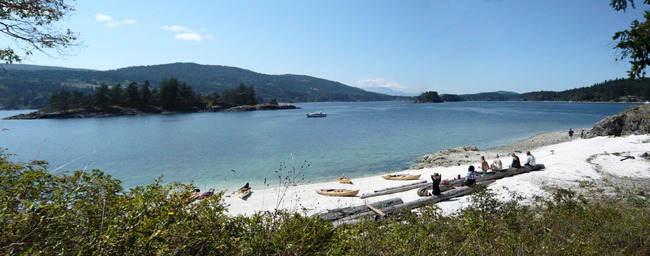 One of the more common arguments I hear against climate change is that it's not possible for humans to change the world around us on a global scale. I find that argument quite ironic, because it often comes from people who then brag about how humans have managed to control the environment around us. Building cities, taming rivers, flattening hills and mountains for roads. The fact of the matter is that we can have huge impacts on the world around us.
One of the more common arguments I hear against climate change is that it's not possible for humans to change the world around us on a global scale. I find that argument quite ironic, because it often comes from people who then brag about how humans have managed to control the environment around us. Building cities, taming rivers, flattening hills and mountains for roads. The fact of the matter is that we can have huge impacts on the world around us.
There is a reason for the photograph above in relation to this post. I took this picture on an island that we kayaked to while on holidays on Saltspring Island in BC last week. What looks like a white sandy beach isn't. It's actually broken shells, and is not a natural occurring beach. The natives that lived in the region ate shellfish, and this was one of the many beaches that they used to clean shellfish. It makes sense that they would do this away from their village because of the smell from piles of shells. Historians figure that the same beaches were used for thousands of years and the shells piled up. A beach changed forever by human activity, and still noticeable today. I found that idea quite profound. If a population of humans that numbered in the thousands or tens of thousands could change the look of an island through their activities, what are 6.7 billion people capable of doing?
I think the main obstacle to convince people that they should do something about the environment is to convince them that we do have a large impact on our environment, and that we can cause changes on a global scale. I sometimes find it hard to believe that some people can't see these things, but when I start to think about modern lifestyle it does make sense. We spend our lives in our homes venturing out to head to work and shop. We spend most of our time in large cities or in the case of rural Manitoba surrounded by farms. All man made environments. We have separated ourselves from world's environment.
If there was one thing that I think people should do to convince them that we are damaging the earth, I think they should get out into the wilderness. Hike, camp, canoe, kayak, or any other activity that gets them away from a man made environment. From there people can better see how much we have already changed our environment, and how quickly we are continuing to do it.
Harvest Update
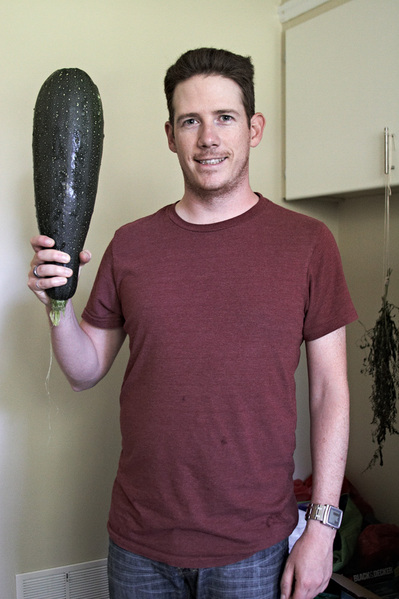 Well we've pulled some more stuff out of our garden. Check out the whole list of produce we grown here. Best thing we've grown so far, a 5 lb 3.5 oz zucchini shaped like a club. Amanda has baked with some of the zucchinis, but probably have 8 lbs of zucchini in the fridge. What to do, what to do?
Well we've pulled some more stuff out of our garden. Check out the whole list of produce we grown here. Best thing we've grown so far, a 5 lb 3.5 oz zucchini shaped like a club. Amanda has baked with some of the zucchinis, but probably have 8 lbs of zucchini in the fridge. What to do, what to do?
2010 Garden Harvest
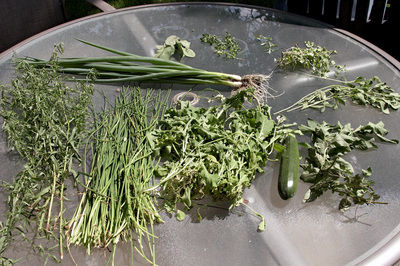
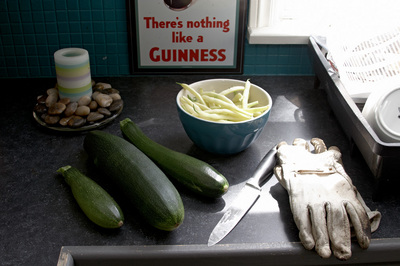 Check it out here: Harvest 2010
Check it out here: Harvest 2010
Help Feed Yourself
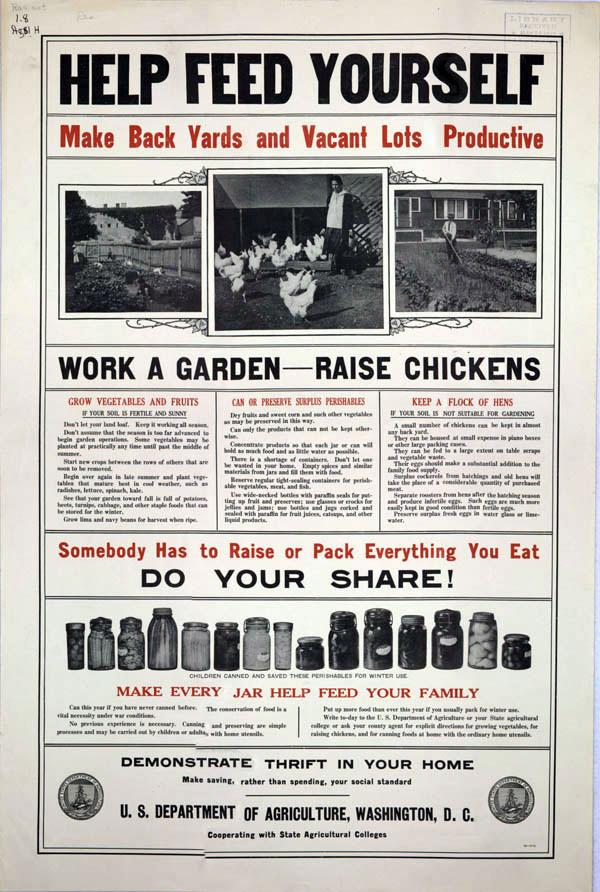
I ran across this image today and thought it was great. I know that today we have less reason to garden. Our food isn't rationed, and we're not in a war that would require people to skimp and save. However, local food is a great way to reduce your impact on the environment. Farmers Markets are great for getting local food. However not everything at the farmers market is necessarily local and/or organic. Always make sure you ask where the food is from, and how it was produced.
Growing your own garden is a great way to be assured that the food is local and chemical free. Plus nothing tastes better than food you've produced yourself. So try it! Grow your own garden whether it's in your backyard, on your patio, on your balcony, or in a community garden close to your house.
You can find more of these images in this gallery titled Beans are Bullets
First Garden
Since moving into my house in the spring of 2007, I've been wanting to have a garden. It's been a long time coming because of other issues that had to be dealt with first. I did till a small plot within my backyard fence for some herbs, and to hold some hostsa for my flowerbeds while foundation work was being done to my house. The problem with that plot was not a lot of sunlight because of the tall oak trees I have in my backyard. Luckily enough my back fence is inset off the back lane by about 10 feet, so I have ample room back there for a bit of a garden.
The back lane is to the south of my house and gets a lot of sunlight, so it's perfect for a garden. I had already set up two composters back there. So they're nice and close for getting compost, and for throwing garden waste into. The area is full of gravel from a parking space for a trailer (that's why the fence was moved up apparently), and any Winnipeger who has tried to garden knows what it's like to deal with the clay that we have in our soil. For that reason I decided to do a raised bed garden. The other advantage of a raised bed garden is water management. Raised bed gardens also drain well so your garden doesn't get flooded as easily. With the amount of rain that we've had fall this year, this proved to be a wise decision.
The Build
Last summer I built raised beds in front and behind my house for flower beds with 4x4 cedar. That was a tad pricey, and I wanted to keep this garden cheaper than that. I found some great brackets from Lee Valley tools for crate building that they recommend for building quick raised beds. I picked up a few sets, and some 1x8 lumber from the lumber store close to my house. This is what I came up with:
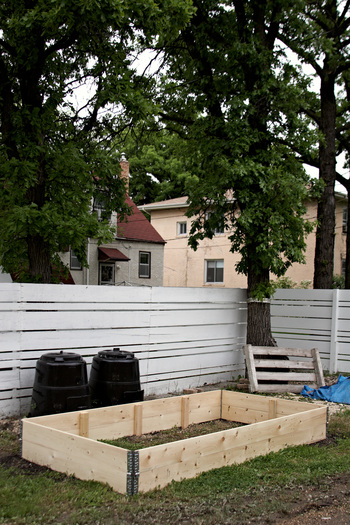
The dimensions of it is 5 feet by 10 feet and 16 inches high. I strapped the two layers on the inside with some 2x4s and dug them down about 8 inches into the ground to prevent excessive bowing when it's full of soil. You can also see the close proximity of my composters, which should make them quite convenient.
Once I was done the build I ordered myself 5 yards of three-way mix (compost, sand, and peat). I didn't want any soil in it as it tends to be quite heavy with clay in this part of the provence. The dump truck driver was able to dump the soil right into the box, and I just had to rake it out flat. The box only needed around 3 yards of soil, and the rest I spread on the grass in my back yard.
This actually turned out to be a cheaper and faster project than I expected. All in all I needed:
- $30 for two sets of crate brackets
- $70 for eight ten foot 1x8s
- $130 for 5 yards of soil (note only 3 yards for the box)
- 8 hours of time to build and fill the box with soil
The Finished Product
Of course, as it always does, the rain started right when I got my soil delivered. I managed to get it leveled out in my box, and some of it moved into the back yard before too much fell. The summer of 2010 has proven to be a rainy year, which is good and bad. It meant I had a tarped pile of dirt in my back lane for longer than I wanted. However it also meant that once we got the garden planted, I haven't had to water it once. This is how things are looking as of last night:
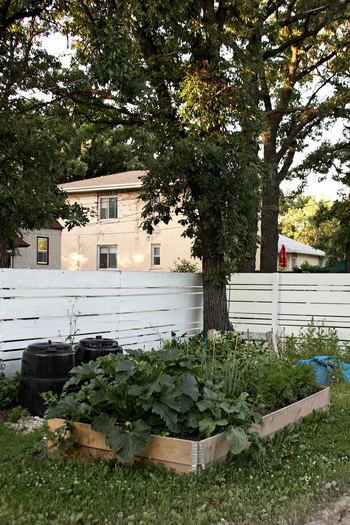
We have a few types of peppers, tomatoes, beans, peas, carrots, zucchini, cucumbers, turnip, and squash planted in there. In fact, I think it's planted a little too dense, but lesson learned for next year.
Issues
There are a few issues with this garden, so I thought I'd mention them if you're wanting to do something similar.
The ten foot long sides bowed more than I expected once it was filled with soil. In retrospect I should have put in a cross brace at the top of the garden in the middle of the ten foot long runs. I could have also used 2x8 lumber, but that would have required chamfering the lumber on the ends. The other option was to build two 5x5 beds instead of one giant 5x10 bed. Next spring I think I'll put in a cross brace to try and prevent the bowing from getting worse.
I had an issue with all the peat floating to the top of the soil and forming a crust on top. I've broken it up a couple times this year and turned it back into the soil. Next time I'd do a little more reading to figure out what I should fill the beds with. It's been a couple of months now, but it seems like the peat is finally broken down enough that it's not floating to the top in the same manner. I believe that my neighbour uses a compost sand mix with no peat in her beds and gets good results.
The tomatoes, zucchini and cucumbers are HUGE, and are overwhelming the other plants in the garden. Next year those plants will go into their own containers separate from this bed. That would mean we would have room for more beans, peas, peppers, and carrots.
Why Be Green?
Why Be Wasteful?
I think it's good to reverse this question right from the get go. Why be wasteful? Waste is a fact of life, and all plants and animals produce waste in our environment. The difference between us and the rest of life on the planet is that a vast majority of our waste is not useful to other forms of life. This is either because of it's make up or its quantity. Wasteful habits are sold to us as being more convenient or easier on our pocketbook.
Convenience
Individual yogurts are quick and easy to take out of the fridge and put into a lunch, but it doesn't really saving that much time over taking a larger container of yogurt out of the fridge and placing a serving into a reusable container.
It's easier just to use the bags at the grocery store instead of bringing our own, but reusable bags are not that much of an inconvenience to bring along with us, and wash from time to time.
Cost
It's cheaper to buy a foil pan for roasting a chicken instead of buying a reusable one, but it's not cheaper over the years, and definitely not cheaper than borrowing one.
Styrofoam plates are much cheaper than paper plates made from recycled paper, but the cost to the environment when they are disposed of in a landfill is not factored into the price.
So Why Do We Do It?
A lot of these things are not really more convenient, or cheaper if we factor in the true cost of disposal. They are sold to as as if they are, and we don't question it. It's a natural thing to not question things we are told. In our busy lives questioning takes time and energy. Something that we don't always excess amounts of. So, if these these aren't really cheaper, and aren't really more convenient, then we don't have a good reason to be so wasteful.
Bad Habits
Even once we figure out that these things may not be more convenient or cheaper we continue to do them. That's because they become habit, and that bad habit needs to be broken. Change is not always easy. When we spill a drink, it is so easy out of habit to grab the roll of paper towel to clean it up instead of a cloth towel. Though that habit can be replaced with the habit of questioning, is there a better way that I could be doing this?
Why Be Green?
We have a responsibility to take care of this planet for our own well being, and for the well being of future generations. The Earth is getting more densely populated, and it is easier and easier for us to have huge negative impacts on the environment. We shouldn't wait until the environment is in critical condition at the edge of collapse before we do something
Preventative Measures
Doctors don't like to wait until someone has a heart attack until they tell them that they should lower their cholesterol. We shouldn't wait until the climate is at the brink of collapse before we decide to change our habits. We know that cholesterol in the blood is bad so we try to prevent it from getting high in the first place. We also know that many things that we do to our environment aren't good, so we prevent ourselves from harming it in the first place.
Respect
It all comes down to respecting our surroundings and our environment. We need to look at the big picture and realize that we can have massive impact on our surroundings and environment. Most people tend to treat their own backyard with respect. If we learned to treat the Earth as a whole as an extension of our backyard, then we would have more respect for the environment as a whole.
Name Change
When I was at the bookstore recently I found a book called Practically Green. I decided that I should change the name to this site before I get to attached to it. For the time being it'll be nameless until I come up with a new one.
No Impact Man: A Review
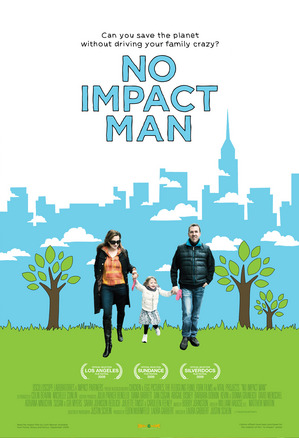
Colin Beavan, a New Yorker, decides to try and live is life with no appreciable impact on the environment for a year. Going to the extreme of trying to live in a New York apartment with not electricity, not using any type of transportation that uses electricity or fossil fuels. The only exception being a trip to visit the farmers that he is purchasing food from in the farmer's market.
Beaven had his motives questioned throughout the movie by both environmentalists and non environmentalists alike. Was his motivation for making the movie fame and fortune, or did he genuinely care about the environment.
I had never heard of this movie before, or about Colin Beavan's blog by the same name, No Impact Man. Immediately I thought that trying to go the the extreme of living with no impact on the environment in the manner he was going was extreme, and a bit silly. I definitely can understand why his motivation was called into question.
In my opinion Beaven's heart is in the right place, and in the end this movie is more about his personal journey to find out what things he can do without in his life. The part I found the most amusing about the movie was the dynamic between Beaven and his wife Michelle Conlin who seemed to be more along for the ride than an active participant.
While I wouldn't recommend going to the extreme of living for a year like this, I do think it is worthwhile to take a look at how you're living your life, and whether there are things that you can do without that would improve your impact on the environment.
My Personal Motivation Pt.2
The second thing that has continued to motivate me to try to live green is the outdoors. I grew up going through Beavers, Cubs, Scouts, and yes Venturers. I was lucky enough to be involved in highly active troops that spent a lot of time in the great outdoors. We had annual Klondike days where we got to practice our outdoorsmanship. We had large camps and jamborees, which usually was pretty easy light camping in large open fields. Finally we went on camps just as a troop in a little bit more remote locations. The last trip I went on was a 14 day hike at Philmont Scout Ranch in New Mexico. That was a great experience, living with what you could carry on your back. We didn’t carry 14 days worth of food with us, there were frequent food pickups and garbage drop offs every three to four days.
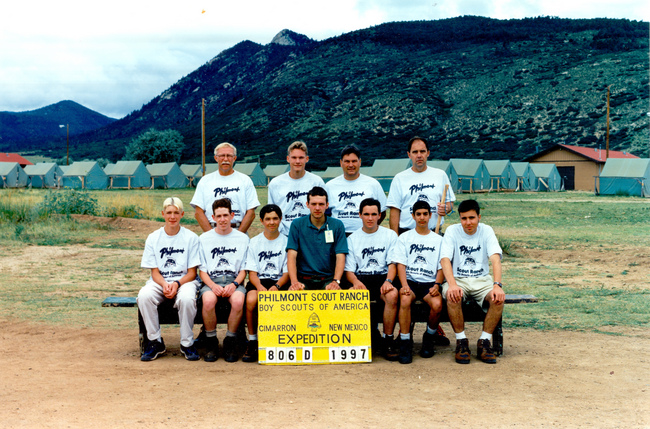
(I'm second from the left in the front row)
Throughout the years I also participated in tree planting events, built and sold cedar compost bins for fundraising. Amazingly 15 years later my parents bins are being used in the back yard.
Scouting taught me a lot of things. The most important of them all being respect for nature. When we went camping everything around us was treated with respect. We only took what we needed and never anything more. We only used dead fall for our fires. We would only cut a few saplings for bannock or marshmallow sticks and shared them. We always left the site cleaner than it was when we got there. If there was garbage on site, it didn’t matter if we brought it or not. We cleaned it up.
In my lifetime my parents had gone from throwing everything into the garbage to composting and recycling as much as possible. In fact my parents were heavily involved in both the school and scouting programs. My mom was heavily involved in the parents committee of recycling program at school. My dad was a leader with the Scout troop for years, and designed and built the composters that we sold.
That is basically where my interest in being good to the Earth came from. It was instilled into me when I was young. Now as I mentioned before, I’m far from perfect, and I do want to strive to be better. That is what this blog is about, my journey towards living a greener more responsible life. I just hope that I can help convince a few other people out there to take the journey as well. I also hope that others will come here and help me learn how to be greener and more responsible.
My Personal Motivation
I’ve been aware, and involved in living green since I was in elementary school through the late 80’s and early 90’s. In the beginning my father convinced me to start recycling aluminum cans. While it was more for the money than it was for saving the environment, it was my first experience with recycling. I collected cans from neighbours, family reunions, any kind of event where people were drinking out of cans. Of course my favorite were beer cans, because the vendors paid back a deposit on those. The pop cans were just crushed and taken to an metal recycling center and I was paid by the pound. After several summers, and my grandpa sending me to the metal recycling center with copper wire and some old car transmissions, I was able to buy a bike with my money. That was the greatest feeling in the world riding a bike that I had basically paid for myself. Shortly after that I got involved in a much larger recycling program.
Our school started a recycling program when I was in Grade 5. We brought in pop bottles we had frozen and capped to pressurize them for a company that was using them in floating docks. We brought our newspapers in for paper recycling. Finally we brought all our cans in as well. We built up quite a pile of stuff in the middle of the school, until it was shut down by the fire inspector for being a hazard. That could have stopped us, but it turned out to be a blessing in disguise. At that point the school or some parents involved with the program at the school had a semi trailer brought to a nearby mall, and we moved our recycling to that site.
People from the community brought us stuff from their houses. Volunteers, admittedly mostly the parents, worked at sorting materials that were brought to the trailer on the weekend and evenings. We were overrun with stuff to recycle. In a nearby neighbourhood there was another group of people who were recycling as well. The two groups got together and had the semi trailer replaced with metal bins. That ended our school’s involvement in recycling.
A year or so later a private contractor started Redbox recycling. Finally people could just leave their recycling out at the curb and have it picked up once a week. After a couple of years of sorting goods in a semi trailer, and then into bins in the mall parking lot. Curbside recycling was a dream come true. After a few years and an appropriate amount of pressure was applied to the city, they finally started a city wide Bluebox recycling program. Though sadly it ended the contracts with the business people who saw a demand for curbside recycling early on.
From this I learned that generally want to treat the earth better. Though they also want it to be convenient. Some people are happy going out of their way to do everything they can to be good to the earth. Others won’t do anything unless it has minimal impact on their life. In the end this is a mutually beneficial thing. Some people break ground in figuring out how to live better. Others create the pressure to make these things easier and more practical.
Now I’m not claiming to be either one of these groups. I get lazy at times, and don’t do everything I can. Other times I go out of my way to be good to our Earth. I’ve decided to document the changes I try to make in my life. There are a few reasons for this. First, so that others can maybe learn from my successes and my failures. Secondly, so that I can learn from my successes and failures. Thirdly, so that if I generate enough interest in this site I can learn from others about how to live my life better.










